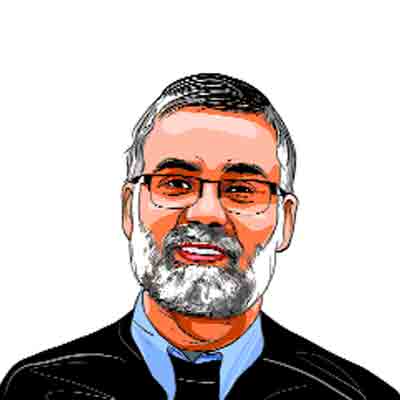Opinion Picture of a Gurugram farmer beside the London Bridge frames aspiration of our times
Today, gods come together with land markets, global financial and statist processes and worldliness isn't separate from divine mysteries
 The photo of a Gurugram villager standing under an iconic tourist spot is a sign of the new worlds of being, buying and believing that just over a quarter century of economic and cultural change has produced, writes Sanjay Srivastava. (Photo: X)
The photo of a Gurugram villager standing under an iconic tourist spot is a sign of the new worlds of being, buying and believing that just over a quarter century of economic and cultural change has produced, writes Sanjay Srivastava. (Photo: X) My most enduring memory of 2024 is likely to be of a villager from Gurugram — a previously impoverished man of the Gujjar caste who is a recent land-sale millionaire — standing under the shadows of London Bridge. In the photo that I have, he is wearing a pair of fashionably ripped jeans, hands folded across his chest in a gesture of confidence that conceals an extraordinary journey from being a village milkman at the bottom of the rural caste hierarchy to global traveler. I have known him over the past 10 years of fieldwork in southern Haryana where, along with clods of earth thrown up by construction machinery, his fortunes have also turned.
As we begin 2025, the photo of a Gurugram villager standing under an iconic tourist spot — just one link in a global chain he intends to complete — is a sign of the new worlds of being, buying and believing that just over a quarter century of economic and cultural change has produced. It is a world of aspirations significantly made through policy-actions of the recently departed Manmohan Singh and successfully re-defined for its own purposes by the BJP and its alliance partners. And, just as importantly, it is also a chronicle of the making of an Indian type that has no precedence. We had better understand the worldview of the man under the bridge in ripped jeans if we are to come to grips with what the times portend. For, his demeanour is that of someone who has, actually, upended ways of thinking about modern life itself.
My 55-year-old visitor began life as a hand-to-mouth dairy farmer, progressing to becoming a middle man for major real-estate companies, who was trusted by villagers to deal with “outsiders” in the sale of their land. His biography forms an integral part of the story of the making of a new Indian type: He is part of a very significant section of the Indian population whose lives make it impossible to think through the binaries of “modern” and “pre-modern”. Why should we bother with this seemingly arcane distinction? Because it lies at the heart of the India that has come to life over the past quarter century and defines a range of cultural, social and (especially) political outcomes in the republic.
We live in an age where the world has not become a “disenchanted” place, to invoke a phrase made famous by the German sociologist Max Weber (1864-1920), through a decline of belief in magic and religion. Rather, as my Gurugram visitor’s life-story tells us, modern life has itself become magical and, hence, re-enchanted in ways that Weber may not have predicted. The crux of the re-enchantment lies — unlike the Weberian understanding of modernity — in what the anthropologist Arjun Appadurai correctly identified as “the capacity to aspire”. Strategies of aspiration now produce world views that are impossible to comprehend through uni-linear ways of understanding the new formations of Indian culture: We do not move from more to less magic. Rather, the new cultures of aspirations — now spread across all strata of society, rather than limited to a privileged minority — have given rise to an imagination that ascribes success to the power of magic and the divine. In a society with such great barriers to economic and social mobility, a magical modernity is not such a strange thing.
“I think to myself”, my Gurugram visitor had once noted, “that I was a peasant with such a small landholding that I could not make a living through farming”. And that “I had no choice but to earn my livelihood by delivering milk door to door on a bicycle… and it is god’s grace that now my relationships are with such significant people in my biradari (fraternity) as well as the outside world”. The extraordinary conditions of deprivation and discrimination that his community had endured — classified as a “criminal tribe” under colonialism, driven to rocky and un-cultivable lands and stigmatised by “higher” castes — makes its current affluence seem miraculous indeed.
However, the “miracle” owes little to divine intervention and is entirely due to strategies that are this-worldly. The men of my visitor’s community have achieved their current level of affluence through learning the tricks of modernity. Land dealings are a very tricky matter, especially when a relatively disadvantaged community must deal with the guiles of large real estate companies and self-serving government machinery. Further, there are byzantine legal procedures to be negotiated. In many instances, a combination of legal, administrative and corporate chicanery has had debilitating consequences for small-scale landholders who have found themselves in the maelstrom of new land markets. However, those who owned bits and pieces of land — unsuitable for farming but large enough for commercial building or a gated residential enclave — have struck gold.
A community banished to the fringes of rural life is now at the centre of national and global level financial processes. God, however, has had little to do with it and learning hardheaded ways of dealing with administrative loopholes, legal minefields and corporate slyness is at the heart of the rise of the global peasant, (to use my visitor’s self-description). He — men make greater headway than women — stands with poise against the backdrop of London Bridge, having mastered the ways of the world. But the new Indian type — of which the global peasant is a representative example — embodies a personality that interprets the world through the language of aspirations.
Aspirations constitute the politics of our times and more traditional forms of politics — human rights, anti-caste movements, land rights, etc — are rarely imagined as part of the lives of those who are thought to be their key beneficiaries. The current era of mass aspirations is quite different from an earlier one that defined Indian life: Traditional nationalism. The latter produced ideas of community life through playing down the notion of individualised aspirations. The current shift to a time of aspirational individualism is, on the other hand, defined by the idea of the cut-piece: Gods come together with land markets, global financial and bureaucratic and statist processes and worldliness is enchanted with the mysteries of the divine hand. Enchantment as a feature of our times is important to understand. It derives from the most fundamental politics of our time, that of aspirations, and the latter itself has multiple political uses. Happy new times!
The writer is British Academy Global Professor, Department of Anthropology and Sociology SOAS, University of London





